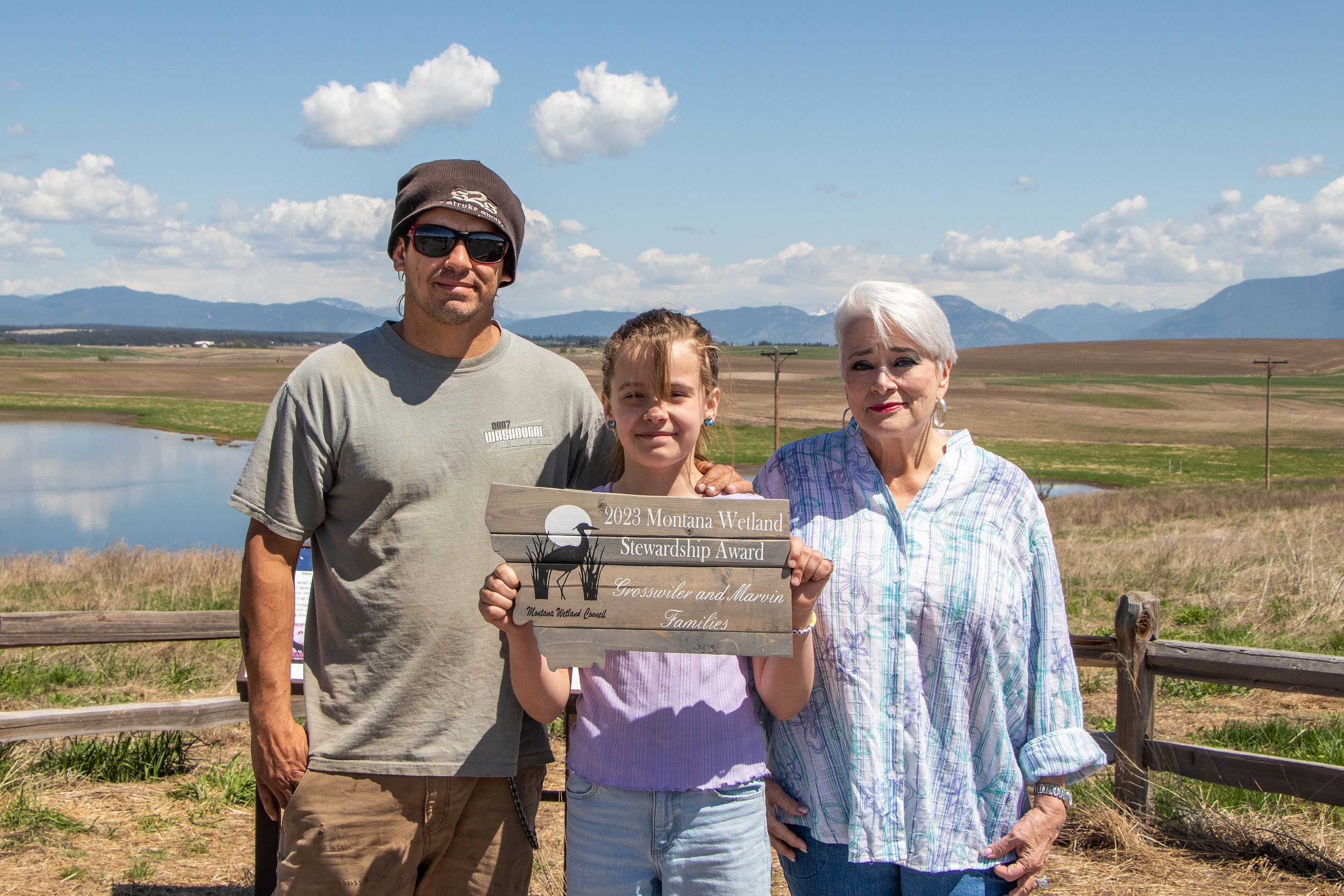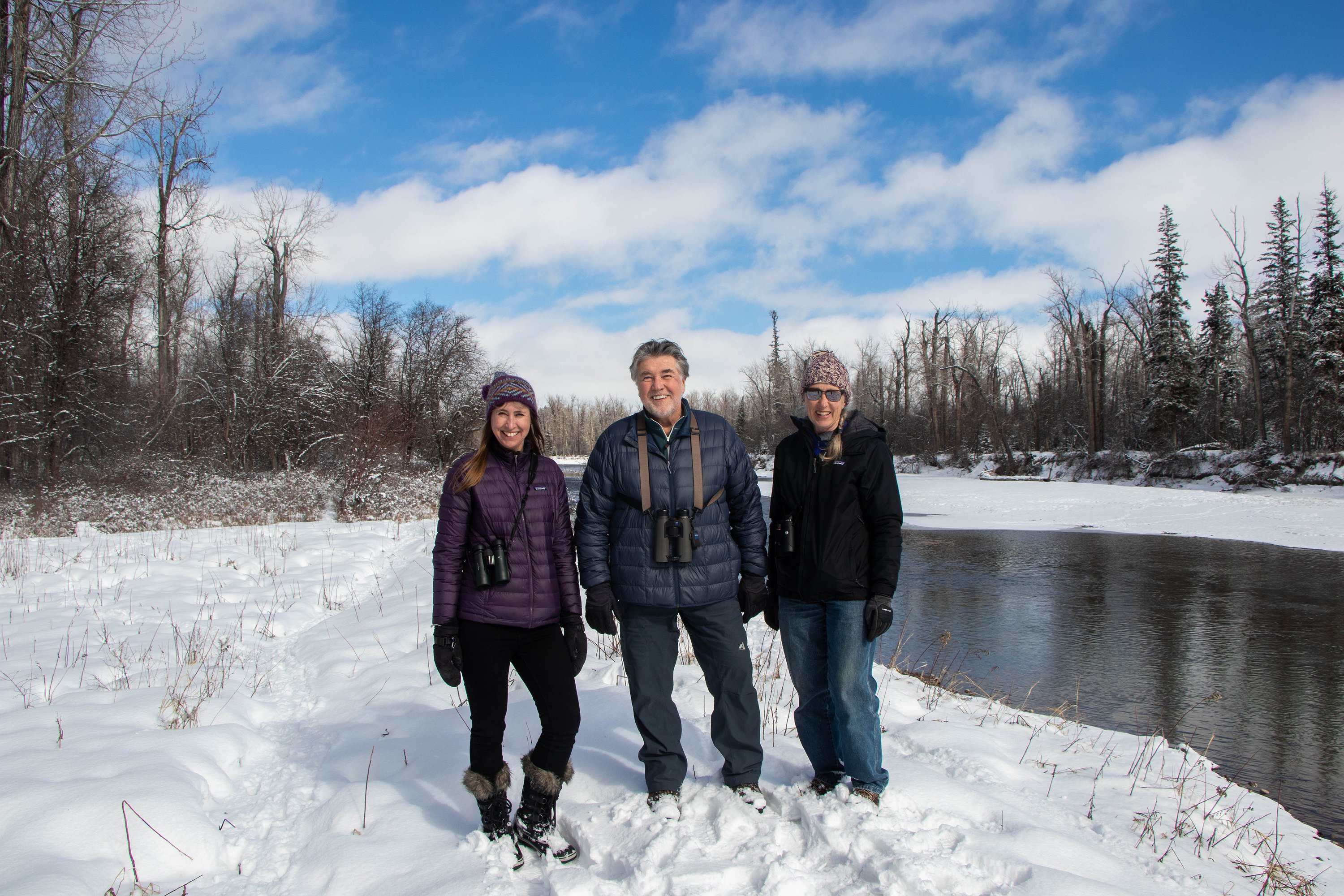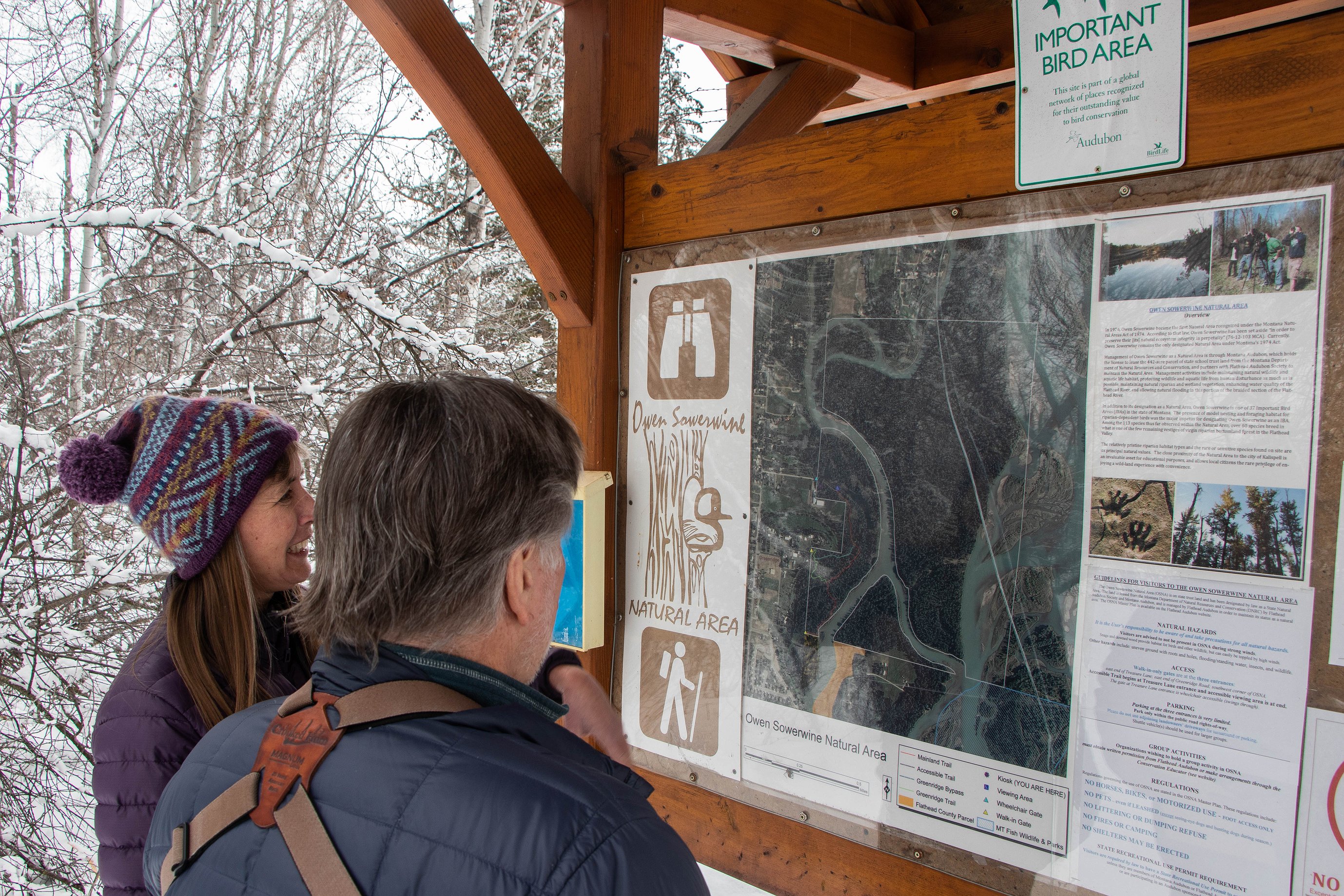Montana
Conservation easements bring permanent protection for Flathead lands

Just east of Kalispell sits a 731-acre farm property owned by Myron and Vicky Mast. With hay bales stacked to the sky, a litter of red heeler puppies running around and a farmhouse built in 1978, the Masts call the farm home.
Their home, as of this year, is officially conserved in perpetuity through a conservation easement, something that has happened multiple times in 2023 across the valley.
“Open spaces are going away,” Myron said. “Somebody has to preserve them. May as well be me and my neighbors.”
Conservation easements are voluntary legal agreements between a land owner and a land trust that permanently limit development on a parcel of land to protect its conservation values. Landowners place their property under an easement — by donating the land or receiving payment for the land or sometimes in a combination of both — agreeing to restrictions typically that the land will not be developed.
The land remains private and landowners can still operate on their land following the terms of the agreement.
Simply, the easement protects the land from future development thus preserving its value for agriculture, timber, open space, recreation and wildlife habitat.
“The Flathead is changing fast and we need to do something before we lose it,” said Mark Schiltz, the Western Manager for the Montana Land Reliance, a nonprofit land trust. “We need to do something to help landowners who want to step up and protect their land.”
The Masts put their Creston land under a conservation easement in November with the help of the Montana Land Reliance, one of the organizations working to preserve productive lands in the valley. The easement actively helps conserve 731 acres of productive farmland, sub-irrigated riparian pasture and forestland.
Myron Mast’s parents in 1930 purchased the first parcel of land at 320 acres. Over time, they acquired more property in the area. Myron, the youngest of six, stewards the land today, farming and cultivating it like his father.
“[My parents] worked very hard to put the land together, I didn’t want to be the one to tear it apart,” Myron said.
The Mast easement received funding through the Natural Resources Conservation Service’s Agricultural Land Easement Program and the Montana Land Reliance’s Richard and Grace Blanchet Fund — named after local farmers who protected their property and left their estate to the Montana Land Reliance to be farmed.
“It’s a feeling of confidence that it’ll stay that way,” Myron said about his land. “To know it’ll stay that way after I’m gone is a comforting thought.”
The Montana Land Reliance focuses on preserving properties in the Creston Bench area, specifically with the intent of protecting farmlands. The group completed the one conservation easement in 2023, but has multiple in the works for 2024 including more land in Creston.
“In a world that is changing so fast, cultural changes, social changes, technology changes, certainly changes in our values and with people… we live in change all the time,” said Schiltz. “But a conservation easement is the only tool to stop change, literally stop it. That land will never change.”
NOT ONLY do easements keep landscapes intact, but they also protect the conservation values on that landscape — including habitat and natural areas, according to Paul Travis, executive director of the Flathead Land Trust.
The Flathead Land Trust is another conservation trailblazer in the area. The trust saw multiple completed easements this year and anticipates in 2024 finishing its biggest current project, the Owen Sowerwine Natural Area.
The natural area — a 442-acre tract of land just half a mile east of Kalispell — is School Trust Land administered by the Department of Natural Resources and Conservation, meaning that it is used to generate revenue for schools in Montana.
Currently, those revenues come from license fees, paid by Audubon organizations, to designate the land as a natural area.
Besides its trails, a footbridge, and a couple of birdhouses, the land is mainly a place for wildlife alone. The addition of an easement, Travis said, ensures a long-term, financially sound option to ensure the habitat and wetlands remain intact.
The easement will go directly to the school trust fund to further bypass the use of licenses on the property, protecting the land while not disrupting funding provided to the fund.
The Montana State Land Board unanimously approved the easement last week. According to the Flathead Land Trust, the easement is on track to be finalized in early 2024. The easement will be purchased for its appraised value of $970,000.
With the added conservation easement, virtually nothing is changing, Travis said. The main change is a matter of funding; in fact, the point is to secure — not change — the conditions that currently exist on the ground to preserve the area for the future.
In addition to finalizing the easement for Owen Sowerwine, Flathead Land Trust has helped private landowners conserve their land in perpetuity.
In the final days of December 2022, the Flathead Land Trust finalized an easement on 655 acres of farmland and wildlife habitat along the Stillwater River, owned by the Kohrs family.
“The easements are protecting our quality of life in Northwest Montana,” said Laura Katzman, a land protection specialist for the Flathead Land Trust, back in January. The easement set the stage for a successful 2023.
The land trust completed its first 2023 easement in January with the conservation of a 24-acre open-space property owned by Pat Nissen.
The property is adjacent to another 27-acre stretch of conservation property and, according to the land trust, the Nissen property serves as a wildlife movement corridor for bears and other animals between the Whitefish Range and Stillwater River.
“I could see where things were going around here and I wanted to do what I could to save at least a little bit [of land],” Nissen said in an interview in February.
In May, the Flathead Land Trust helped Ed Goldberg, who owns 40 acres of land along the Swan River just east of Bigfork, place his land under an easement, helping to protect primarily undisturbed forest and riparian habitat.
Goldberg moved to Bozeman from Boston in the early 2000s. After buying land in the Flathead in 2020, Goldberg quickly fell in love with the land and couldn’t stand to see it developed, he said in June.
When a friend of Goldberg’s, who works with conservation efforts in California, recommended he reach out to a local conservation group to protect the property, it was an easy decision, he said.
“It was a pretty simple process,” said Goldberg. “Let this hopefully be a catalyst.”
Though the conservation easements came in 2017 and 2018, the Grosswiler family this year was honored for their efforts in preserving land. The owners of 396 acres of farmland, open space and critical habitat west of Kalispell, the family placed their land under an easement with the help of the Flathead Land Trust.
This year, the Grosswilers were one of five individuals and families to receive the 2023 Montana Watershed and Wetland Stewardship Award, an award based on leadership and dedication to protecting land and water statewide.
The family also worked with Montana Fish, Wildlife and Parks to grant public access on a portion of their land, creating the West Valley Bird and Wildlife Viewing Area, which overlooks the property, has parking, a few benches, a tower viewer and is popular for birders.
“We can’t give enough credit and thanks to our willing landowners for wanting to conserve their lands and enter into a conservation easement, and especially on top of that, allow some public access,” Travis said in May regarding the Grosswilers.
Two additional easements were closed in 2023 by the Vital Ground Foundation, a land trust specifically working toward conserving habitat for and encouraging connectivity between grizzly bears.
“We are really fortunate to be working with some conservation-minded landowners … where we can protect working lands and some of the best scenic space Montana has to offer,” said Mitch Doherty, the group’s conservation director.
The first easement — completed by Vital Ground with collaboration from Montana Freshwater Partners — was placed on 30 acres in the Swan Valley in January. The property is essential for connectivity between the Bob Marshall Wilderness and the Mission Mountain Tribal Wilderness, according to Vital Ground.
This second easement, completed at the end of February, was on 28 acres of land near Eureka, owned by Greg and Lisa Levine.
Vital Ground previously designated the Grave Creek area of Lincoln County — where the Levine’s land is — as an important habitat for grizzly bear connectivity in 2018, according to Doherty. The Levine family’s donated conservation easement will help protect the entire Grave Creek area.
“Knowing that wildlife is consistently moving east to west in there, we knew we could take a deeper dive in conserving the area,” Doherty said in a March interview.
Regardless of location and landscape, easements are a great way to ensure that parts of the valley will remain open and natural, the land trusts emphasize. With the landowners having the decision-making power, each easement is personalized to what makes the most sense for the specific family and specific property.
All three organizations have projects in the works and expect to be completed in 2024, anticipating another successful year of conservation in the valley.
“While each of us have sort of our own niche and our own roles, I think it’s important that we are all working together at the same,” Doherty said in November. “All the land trusts, including Vital Ground, have sort of a long-term commitment to our easements. That is that stewardship piece.”
Reporter Kate Heston can be reached at kheston@dailyinterlake.com or 758-4459.
 Pat Nissen, left, and his son Jake pose for a portrait on their property on Feb. 1, 2023. (Kate Heston/Daily Inter Lake)
Pat Nissen, left, and his son Jake pose for a portrait on their property on Feb. 1, 2023. (Kate Heston/Daily Inter Lake) Tanner Marvin, Gracie Marvin and Catherine Baier gather on their family’s property in West Valley. They are part of the Grosswiler and Marvin families which were honored with the 2023 Montana Watershed and Wetland Stewardship Award for placing their property under a conservation easement. (Kate Heston/Daily Inter Lake)
Tanner Marvin, Gracie Marvin and Catherine Baier gather on their family’s property in West Valley. They are part of the Grosswiler and Marvin families which were honored with the 2023 Montana Watershed and Wetland Stewardship Award for placing their property under a conservation easement. (Kate Heston/Daily Inter Lake) Ed Goldberg stands on his property along the Swan River east of Bigfork on June 22, 2023. Goldberg just placed his 40 acres under a conservation easement. (Kate Heston/Daily Inter Lake)
Ed Goldberg stands on his property along the Swan River east of Bigfork on June 22, 2023. Goldberg just placed his 40 acres under a conservation easement. (Kate Heston/Daily Inter Lake) From left to right stand Laura Katzman, a land protection specialist with the Flathead Land Trust; Denny Olson, the Flathead Audubon Conservation Director; and Pam Willison, the Owen Sowerwine Committee Char, for a portrait near the Stillwater River in Owen Sowerwine on March 1, 2023. (Kate Heston/Daily Inter Lake)
From left to right stand Laura Katzman, a land protection specialist with the Flathead Land Trust; Denny Olson, the Flathead Audubon Conservation Director; and Pam Willison, the Owen Sowerwine Committee Char, for a portrait near the Stillwater River in Owen Sowerwine on March 1, 2023. (Kate Heston/Daily Inter Lake) The Stillwater River is seen on the Owen Sowerwine parcel on March 1, 2023. (Kate Heston/Daily Inter Lake)
The Stillwater River is seen on the Owen Sowerwine parcel on March 1, 2023. (Kate Heston/Daily Inter Lake) Laura Katzman, with the Flathead Land Trust, and Denny Olson, with Flathead Audubon, look at the Owen Sowerwine map on March 1, 2023. (Kate Heston/Daily Inter Lake)
Laura Katzman, with the Flathead Land Trust, and Denny Olson, with Flathead Audubon, look at the Owen Sowerwine map on March 1, 2023. (Kate Heston/Daily Inter Lake) A northern flicker at the Owen Sowerwine Natural Area. (JP Edge photo)
A northern flicker at the Owen Sowerwine Natural Area. (JP Edge photo)
Montana
Headwaters Classic hosts Montana's largest youth lacrosse tournament

BOZEMAN, Mont. — Lacrosse athletes from all over the upper Rocky Mountains flocked to Bozeman for the weekend for the Headwaters Classic.
“We try and host a tournament in Bozeman every year, unfortunately, with schedules it doesn’t happen every single year,” Headwaters Lacrosse president Mike Bonville said. “This is the first time we’ve had a tournament this size though.”
The Headwaters Classic was put together primarily by Headwaters Lacrosse and Treasure State Lacrosse , with help from Bozeman Lacrosse and Montana State University.
The tournament brought in over 800 athletes from Montana, Idaho, and Wyoming to compete on the campus of MSU. There were over 70 youth teams from 11 different club programs for both boys and girls, ranging from kindergarten through high school.
“This is the biggest spring tournament in the state’s history I believe, which is super cool, and we’re happy to be a part of it,” Treasure State Lacrosse event coordinator Hailey Blachly said.
But the Headwaters Classic wasn’t the only tournament that MSU was hosting that weekend.
Montana State’s club lacrosse competed with seven other colleges in the Rocky Mountain Lacrosse Championship on the Bobcats’ field. The college club conference championship along with the Headwaters Classic gives kid an inspiration for their future lacrosse careers.
“You can see yourself in their shoes and I think that’s really cool for kids out here to be able to see that there’s a path outside of high school lacrosse. They can go to college, and they can continue to play the sport they love,” Blachly said.
“The thing that’s very special is they get to see the path progression of the game,” Bonville said. “They’re working hard as kids and if they stick with it, there’s an opportunity to play at a pretty high level for the Bobcats or maybe somebody else.”
But the tournament of this size not only helps with the level of competition for the youth, it also invites more athletes to grab a stick and help grow the sport in Montana.
“Having these types of events where we have teams coming from out of state, playing all of the talent in state is really important just to keeping the momentum going with the sport,” Bonville said. “It’s a very fun sport, lots of action, and kids are busy out there on the field, and once they get the taste of lacrosse, it’s tough to beat it as a spring sport.”
It is unknown at the time whether or not the Headwaters Classic will return in 2026 to fit other club schedules. However, this tournament set the new standard for what lacrosse can be in the Treasure State.
“Having all of these teams come to Bozeman is great sign that Bozeman’s a great place for people to come, bring their kids, and play lacrosse,” Bonville said. “Our goal is to make this something that people plan on every year and it’s on the calendar, and it doesn’t matter if you live in Bozeman, Montana, Idaho, Wyoming, or beyond, you’re circling this weekend that you’re going to be playing in Bozeman at the Headwaters Classic.
“Sometimes its hard to get everyone from different areas of the state together in one spot, because there’s tons of different challenges,” Blachly said. “Headwaters, Bozeman, Treasure State, and MSU all being on the same page to support an event like this is awesome, and I think that bodes well for other places in the state in the future to say, ‘Hey, we can bring the youth, high school, and college together to have one event. We can work together,’ and that’s going to create awesome growth going forward.”
Montana
Montana WR Junior Bergen Selected 252nd-Overall by 49ers

In Monterrey, Mexico alongside fans of the San Francisco 49ers, “The Warning,” Afredo Gutierrez, and 49ers Pro Football Hall of Fame linebacker Patrick Willis announced San Francisco’s selection of Indiana Hoosiers defensive lineman C.J. West in Round 4 of the 2025 NFL Draft with the No. 113 overall pick.
Montana
Montana Lottery Mega Millions, Lucky For Life results for April 25, 2025
The Montana Lottery offers multiple draw games for those aiming to win big. Here’s a look at April 25, 2025, results for each game:
Winning Mega Millions numbers from April 25 drawing
38-40-60-62-70, Mega Ball: 09
Check Mega Millions payouts and previous drawings here.
Winning Lucky For Life numbers from April 25 drawing
09-15-40-41-48, Lucky Ball: 05
Check Lucky For Life payouts and previous drawings here.
Winning Big Sky Bonus numbers from April 25 drawing
05-12-15-30, Bonus: 03
Check Big Sky Bonus payouts and previous drawings here.
Feeling lucky? Explore the latest lottery news & results
When are the Montana Lottery drawings held?
- Powerball: 8:59 p.m. MT on Monday, Wednesday, and Saturday.
- Mega Millions: 9 p.m. MT on Tuesday and Friday.
- Lucky For Life: 8:38 p.m. MT daily.
- Lotto America: 9 p.m. MT on Monday, Wednesday and Saturday.
- Big Sky Bonus: 7:30 p.m. MT daily.
- Powerball Double Play: 8:59 p.m. MT on Monday, Wednesday, and Saturday.
- Montana Cash: 8 p.m. MT on Wednesday and Saturday.
Missed a draw? Peek at the past week’s winning numbers.
Winning lottery numbers are sponsored by Jackpocket, the official digital lottery courier of the USA TODAY Network.
Where can you buy lottery tickets?
Tickets can be purchased in person at gas stations, convenience stores and grocery stores. Some airport terminals may also sell lottery tickets.
You can also order tickets online through Jackpocket, the official digital lottery courier of the USA TODAY Network, in these U.S. states and territories: Arizona, Arkansas, Colorado, Idaho, Maine, Massachusetts, Minnesota, Montana, Nebraska, New Hampshire, New Jersey, New York, Ohio, Oregon, Puerto Rico, Washington D.C., and West Virginia. The Jackpocket app allows you to pick your lottery game and numbers, place your order, see your ticket and collect your winnings all using your phone or home computer.
Jackpocket is the official digital lottery courier of the USA TODAY Network. Gannett may earn revenue for audience referrals to Jackpocket services. GAMBLING PROBLEM? CALL 1-800-GAMBLER, Call 877-8-HOPENY/text HOPENY (467369) (NY). 18+ (19+ in NE, 21+ in AZ). Physically present where Jackpocket operates. Jackpocket is not affiliated with any State Lottery. Eligibility Restrictions apply. Void where prohibited. Terms: jackpocket.com/tos.
This results page was generated automatically using information from TinBu and a template written and reviewed by a Great Falls Tribune editor. You can send feedback using this form. Our News Automation and AI team would love to hear from you. Take this survey and share your thoughts with us.
-
News1 week ago
Harvard would be smart to follow Hillsdale’s playbook. Trump should avoid Biden’s. | Opinion
-

 Politics6 days ago
Politics6 days agoVideo: Hegseth Attacks the Media Amid New Signal Controversy
-
Business1 week ago
Porto's Bakery moving forward in Downtown Disney, replacing Earl of Sandwich
-

 Culture5 days ago
Culture5 days agoNew Poetry Books That Lean Into Calm and Joy Amid Life’s Chaos
-

 Politics1 week ago
Politics1 week agoSupreme Court blocks new deportations of Venezuelans in Texas under 18th century Alien Enemies Act
-

 News1 week ago
News1 week agoMaps: Where Do Federal Employees Work in America?
-

 Politics1 week ago
Politics1 week agoPope Francis and US presidents: A look back at his legacy with the nation's leaders
-

 World6 days ago
World6 days agoNew Zealand’s minor gov’t party pushes to define women by biological sex



















